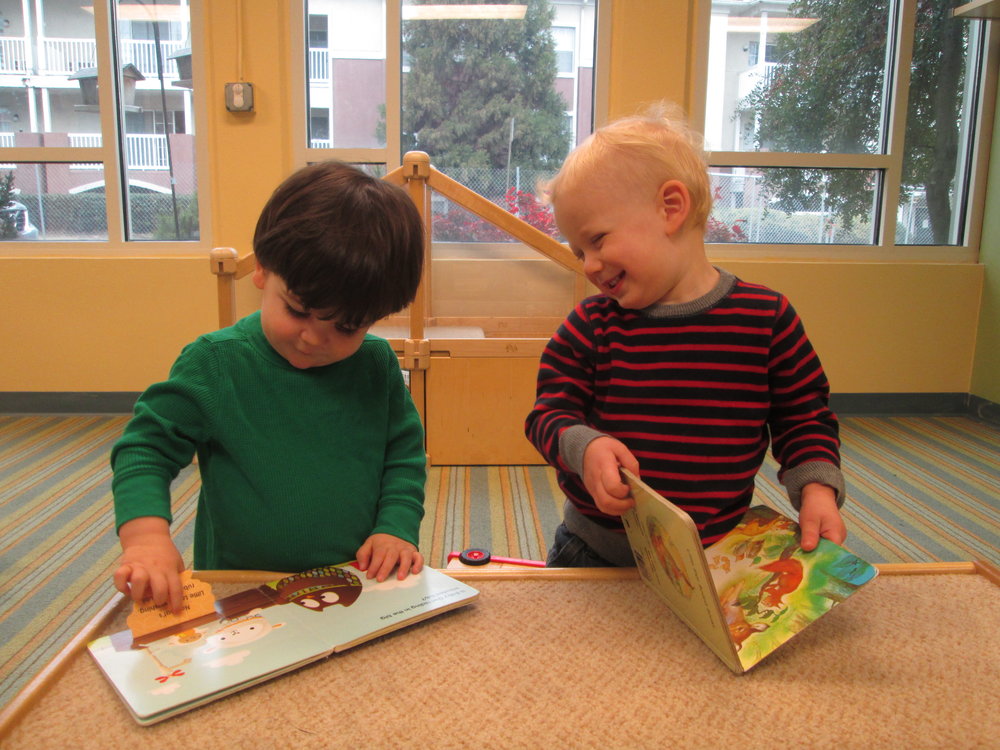
Continuing our series of Montessori-approved activities to do at home, we will now address the pre-primary level (ages two to three). At this age, the child still has a desire for independence, but is now capable of taking on more complex tasks.

Chores:
This is the perfect age to introduce simple, daily chores. Folding laundry, washing dishes, picking up her room- all of these things involve your child in the everyday tasks of living and participating in a household. Choose jobs that your child can do successfully by herself, and ones that she can do every day, since children at this age benefit from consistent routines.
Preparing a Snack:
Children love working with food at any age, so giving your child some autonomy in the kitchen is a great way to reinforce her sense of independence. Allow your child to make her own snack, for example, or even a snack for the family. Have a small selection of appropriate foods available, and allow your child to choose which she would like to prepare. Then let her go to town! Some examples of simple snacks that a child could make would be: chopping an apple (with your help) and spreading each slice with peanut butter, pulling grapes off of the stems, washing them, and placing them in a bowl. Or you could even mash up an avocado and add a little lime juice to make guacamole. The possibilities are endless! After the snack is ready, help your child serve it, and then sit with her to eat. This is a great time to model appropriate mealtime behavior, and to connect with your child. Then when you are both finished, show her how to clean up (wash the plates, wash the prep tools, etc).
Toileting:
Getting your child comfortable with using the toilet is a big step. Teachers work with children on using the toilet in the classroom, but it’s extremely important for parents to follow up at home. Keep a small potty chair in your bathroom, along with a basket of clean underwear, and a bucket for soiled underwear. Show your child how to use the potty, and how to clean up if there is an accident. Offer opportunities for him to sit on the potty, such as when he gets up in the morning, and after mealtimes. If he declines, accept that, and offer him another chance at a later time. Be consistent, don’t force anything on your child, and remain positive and encouraging.

Reading:
Reading is a wonderful activity at any age, but it’s especially fun with two-year-olds because they are able to be more involved with choosing and interacting with a story. Ask your child simple questions about what is being read (Can you find the cow? What does a cat say? Etc.). If he chooses, your child could even act out the story! Some good books for this age group include We’re Going on a Bear Hunt by Michael Rosen, Goodnight Gorilla by Peggy Rathmann, and Freight Train by Donald Crews.
Free Play:
In this busy world, children benefit most not from lots of structured activities, but from time when they are allowed to simply play. Giving your child plenty of unstructured play time at home allows her to develop her concentration and flex her problem-solving skills. Open-ended toys like blocks, dolls, stuffed animals and balls tend to occupy children’s attention for longer periods of time and encourage creativity.
Limited Choices:
Allowing your child to make choices at this age can be a great way to prevent tantrums and power struggles, as well as accommodate his desire for independence, but the key is to offer limited choices. Choose two, weather-appropriate outfits, and then allow your child to pick which one to wear. Offer two options for breakfast, and let him pick which one he wants to eat. Ask if he’d like to put his jacket on first, or his shoes when it’s time to leave the house. Giving your child choices lets him feel a sense of control, but limiting them provides structure and safety.
Resources
- How to Raise an Amazing Child The Montessori Way by Tim Seldin
- Montessori From The Start by Paula Polk Lillard and Lynn Lillard Jessen
- For Small Hands is a branch of Montessori Services, which provides Montessori practical life, science and cultural materials for schools and parents. Check out their website at www.forsmallhands.com to find child-sized kitchen tools and much more!

